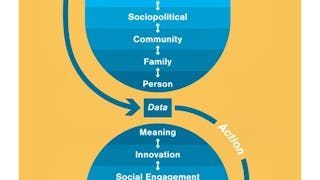Dieser erste von fünf Kursen führt die Studenten in die sozialen Determinanten der Gesundheit ein und bietet einen Überblick über die Definitionen und theoretischen Perspektiven, die die Grundlage für diese Spezialisierung bilden werden. Die Themen dieses Kurses umfassen: 1. Einführung in die sozialen Determinanten der Gesundheit 2. Theoretische Perspektiven und Wissenskomplexität 3. Datengesteuerte kollektive Wirkung 4. Theorie des Minderheitenstresses 5. Datenanwendungen: Häufigkeitsanalyse und Visualisierung von Balkendiagrammen

Genießen Sie unbegrenztes Wachstum mit einem Jahr Coursera Plus für 199 $ (regulär 399 $). Jetzt sparen.

Einführung in die sozialen Determinanten der Gesundheit
Dieser Kurs ist Teil von Spezialisierung für Soziale Determinanten der Gesundheit: Daten zum Handeln


Dozenten: Daniel J. Pesut, Ph.D., RN, FAAN
Bei enthalten
(15 Bewertungen)
Kompetenzen, die Sie erwerben
- Kategorie: Datengesteuerte Entscheidungsfindung
- Kategorie: Soziale Auswirkungen
- Kategorie: Datenanalyse
- Kategorie: Gesundheitliche Ungleichheiten
- Kategorie: Systemorientiertes Denken
- Kategorie: Gesundheitsinformatik
- Kategorie: Soziale Determinanten der Gesundheit
- Kategorie: Datenvisualisierung
- Kategorie: Öffentliche Gesundheit
- Kategorie: Gemeinschaft Gesundheit
- Kategorie: R-Programmierung
- Kategorie: Gesundheitliche Chancengleichheit
- Kategorie: Gesundheitspolitik
Wichtige Details

Zu Ihrem LinkedIn-Profil hinzufügen
Erfahren Sie, wie Mitarbeiter führender Unternehmen gefragte Kompetenzen erwerben.

Erweitern Sie Ihre Fachkenntnisse
- Lernen Sie neue Konzepte von Branchenexperten
- Gewinnen Sie ein Grundverständnis bestimmter Themen oder Tools
- Erwerben Sie berufsrelevante Kompetenzen durch praktische Projekte
- Erwerben Sie ein Berufszertifikat zur Vorlage

In diesem Kurs gibt es 5 Module
Das Ziel dieses Moduls ist es, eine Einführung in die sozialen Determinanten der Gesundheit im Rahmen dieser Spezialisierung zu geben. In Lektion eins werden wir die sozialen Determinanten der Gesundheit definieren, untersuchen, wie sich unser Verständnis der sozialen Determinanten im Laufe der Zeit verändert hat, und analysieren, welche Auswirkungen gesundheitliche Ungleichheit auf die Gesellschaft hat. Außerdem werden wir uns mit der Vielfalt der Transformer-Ideen befassen, die zur Beseitigung gesundheitlicher Ungleichheit eingesetzt werden können. In der zweiten Lektion werden wir uns mit verschiedenen Arten des Wissens beschäftigen und damit, wie das Wissen der Gemeinschaft mit Daten erweitert werden kann, um die Politik zu beeinflussen. Wir werden auch die definierenden Merkmale von Daten bewerten, während wir beurteilen, wie Daten, Analysen und Partnerschaften genutzt werden können, um Macht für transformative Veränderungen zu schaffen.
Das ist alles enthalten
4 Videos10 Lektüren2 Aufgaben1 Diskussionsthema8 Plug-ins
Ziel dieses Moduls ist es, eine Grundlage für theoretisches Wissen zu schaffen, um das Systemdenken und die Grundsätze des Wissensmanagements in Bezug auf Gesundheitsfaktoren zu unterstützen. Systemdenken bedeutet, Unterscheidungen zu treffen, Systeme, Beziehungen, Standpunkte und Perspektiven zu verstehen. In Lektion eins lernen wir die DSRP-Theorie im Hinblick auf die Entwicklung einer systemorientierten Denkweise kennen. In Lektion zwei stellen wir das Sanduhrmodell "Data to Action" als konzeptionellen Rahmen und eine Möglichkeit vor, über die verschiedenen logischen Ebenen und Beziehungen zwischen und unter den Gesundheitsfaktoren nachzudenken.
Das ist alles enthalten
2 Videos4 Lektüren2 Aufgaben1 Diskussionsthema3 Plug-ins
Ziel dieses Moduls ist es, das Konzept der kollektiven Wirkung als Modell und Methode für die Gestaltung datengesteuerter Initiativen zur kollektiven Wirkung vorzustellen. Die Grundsätze und Phasen der kollektiven Wirkung werden beschrieben und erläutert. Das Konzept der kollektiven Wirkung erfordert einen Bewusstseinswandel, der die Aufmerksamkeit auf das Systemdenken lenkt. Eine Denkweise der kollektiven Wirkung unterstützt und fördert die Zusammenarbeit und die Teamwissenschaft sowie die Verwendung standardisierter Datensätze, um die Wissensarbeit und die Übersetzung mit Datensätzen der Gemeinschaft und der Population zu verstehen und zu unterstützen. Fallstudien veranschaulichen die Kraft und das Potenzial kollektiver Bemühungen zur Schaffung transformativer Veränderungen, die die gewünschte Zukunft der Gesundheitsversorgung unterstützen.
Das ist alles enthalten
1 Video6 Lektüren2 Aufgaben1 Diskussionsthema1 Plug-in
In diesem Modul werden wir die Theorie des Minderheitenstresses im Zusammenhang mit den sozialen Determinanten der Gesundheit definieren. In Lektion eins werden wir Stress von Minderheiten definieren und untersuchen, wie systemische Diskriminierung zu Stress von Minderheiten beiträgt. Wir werden auch untersuchen, wie Minderheitenstress zu gesundheitlichen Ungleichheiten führen kann. In Lektion zwei werden wir die Auswirkungen struktureller Ungleichheiten sowohl auf begünstigte als auch auf benachteiligte Gruppen diskutieren. Wir werden auch die persönlichen, zwischenmenschlichen und sozialen Auswirkungen von Minderheitenstress untersuchen. Schließlich werden wir die persönlichen und sozialen Ressourcen bewerten, die zur Verfügung stehen, um Minderheitenstress entgegenzuwirken, sowie die Möglichkeiten, wie Daten genutzt werden können, um transformative Veränderungen zu bewirken.
Das ist alles enthalten
2 Videos2 Lektüren2 Aufgaben1 Diskussionsthema3 Plug-ins
Dieses Modul befasst sich mit der Analyse, Darstellung und Interpretation von Daten über soziale Gesundheitsfaktoren, wobei der Schwerpunkt auf der Identifizierung sozialer Gesundheitsfaktoren in großen Datensätzen liegt. Lektion eins gibt einen Überblick über Frequenzanalysen und Balkendiagramm-Visualisierungen. In Lektion zwei werden wir lernen, wie man die R-Umgebung in Coursera nutzt. Lektion drei führt uns in die Datensätze NHANES und Omaha System ein, die wir in den Modulen zur Datenanwendung in dieser Spezialisierung verwenden werden. In Lektion vier lernen wir, wie man in R Frequenzanalysen durchführt und Balkendiagramme erstellt. Anhand des NHANES-Datensatzes werden wir die Häufigkeiten von Einkommen, Bildung, Familienersparnis, Depression und Versicherung nach Ethnie ermitteln. Anhand des Omaha-System-Datensatzes werden wir die Häufigkeit der gemeinsamen sozialen Determinanten nach Ethnie und Volkszugehörigkeit ermitteln. Abschließend werden wir die Interpretation der Ergebnisse unserer Analyse erörtern, indem wir unsere Ergebnisse mithilfe von Balkendiagrammen visualisieren.
Das ist alles enthalten
4 Videos6 Lektüren1 peer review1 Diskussionsthema1 Unbewertetes Labor4 Plug-ins
Erwerben Sie ein Karrierezertifikat.
Fügen Sie dieses Zeugnis Ihrem LinkedIn-Profil, Lebenslauf oder CV hinzu. Teilen Sie sie in Social Media und in Ihrer Leistungsbeurteilung.
Dozenten


Mehr von Gesundheitsinformatik entdecken
 Status: Kostenloser Testzeitraum
Status: Kostenloser TestzeitraumUniversity of Michigan
 Status: Kostenloser Testzeitraum
Status: Kostenloser TestzeitraumUniversity of Minnesota
 Status: Kostenloser Testzeitraum
Status: Kostenloser TestzeitraumUniversity of Minnesota
 Status: Kostenloser Testzeitraum
Status: Kostenloser TestzeitraumUniversity of Minnesota
Warum entscheiden sich Menschen für Coursera für ihre Karriere?




Häufig gestellte Fragen
Um Zugang zu den Kursmaterialien und Aufgaben zu erhalten und um ein Zertifikat zu erwerben, müssen Sie die Zertifikatserfahrung erwerben, wenn Sie sich für einen Kurs anmelden. Sie können stattdessen eine kostenlose Testversion ausprobieren oder finanzielle Unterstützung beantragen. Der Kurs kann stattdessen die Option "Vollständiger Kurs, kein Zertifikat" anbieten. Mit dieser Option können Sie alle Kursmaterialien einsehen, die erforderlichen Bewertungen abgeben und eine Abschlussnote erhalten. Dies bedeutet auch, dass Sie kein Zertifikat erwerben können.
Wenn Sie sich für den Kurs einschreiben, erhalten Sie Zugang zu allen Kursen der Spezialisierung, und Sie erhalten ein Zertifikat, wenn Sie die Arbeit abgeschlossen haben. Ihr elektronisches Zertifikat wird Ihrer Seite "Leistungen" hinzugefügt - von dort aus können Sie Ihr Zertifikat ausdrucken oder Ihrem LinkedIn-Profil hinzufügen.
Ja. Für ausgewählte Lernprogramme können Sie eine finanzielle Unterstützung oder ein Stipendium beantragen, wenn Sie die Anmeldungsgebühr nicht aufbringen können. Wenn für das von Ihnen gewählte Lernprogramm eine finanzielle Unterstützung oder ein Stipendium verfügbar ist, finden Sie auf der Beschreibungsseite einen Link zur Beantragung.
Weitere Fragen
Finanzielle Unterstützung verfügbar,
¹ Einige Aufgaben in diesem Kurs werden mit AI bewertet. Für diese Aufgaben werden Ihre Daten in Übereinstimmung mit Datenschutzhinweis von Courseraverwendet.





